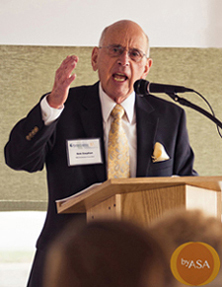Fall 2012 Newsletter
 Dear Friends and Colleagues,
Dear Friends and Colleagues,
30th anniversary cake
As many of you know, KCSDV hosted an event at our office on Friday, September 14th to celebrate our 30th Anniversary. We were thrilled to see almost 200 old friends, new friends, community partners, advocates, and their friends and family. Many shared stories, kind words, and encouragement for the work that has been done and that which continues. Programs across the state incorporated KCSDV’s 30th Anniversary into their own events. I was honored to attend events hosted by the Metropolitan Organization to Counter Sexual Assault (MOCSA) in Kansas City, Emporia’s SOS, Inc., and the Sexual Assault/Domestic Violence Center in Hutchinson.
It is hard to put in to words the gratitude that I feel and that many others feel about the compassion, commitment, and collaboration that have gone into these last 30 years of coalition-building. I know I speak for all of us at KCSDV when I say – thank you! Thank you for the cards and notes, thank you for your support throughout the years, and thank you for standing with KCSDV and with survivors in Kansas.
Every one of us has played a role. You may be a community member who has given a victim the hotline number or provided comfort and safety. You may be a teacher who has responded appropriately to a child afraid to go home. You may be a law enforcement officer who has put his or her life on the line to keep a family safe. You may be an advocate who has listened and supported and listened some more. You may be a public official or legislator who has gone the extra mile to make sure our policies and laws protect victims and our communities. You may be someone who has donated the funds to keep the work going. You may be the scout leader who has encouraged boys to choose respect.
And, all of us know today that the real work is done every day by survivors of sexual and domestic violence who get up each morning and try to figure out how to recover from the trauma they have experienced or who try to keep their families together and their children safe.
Ending domestic violence and sexual assault is a community responsibility. We must all do our part.
As I asked on the 14th, I ask again – where do we go from here? How will we stay energized for the future? I am constantly telling staff this is a marathon not a race. There is so much to be done, even in the face of having done so much. It is difficult not to be overwhelmed.
Here’s what I think is on our plate:
Survivors and victims and their families will always need safety and support. We must sustain that work.
Allied professionals and advocates will always need information and training in order to provide this safety and support. We must sustain that work.
But, primary prevention is really our next big piece of work. For eons, women and children have been subjected to abuse and trauma because our culture, our laws, our religions all said it was okay. Two centuries ago, courts told men how they should beat their wives not that they couldn’t. Thirty years ago, it was legal to rape your wife. Today, that is not the case in Kansas. This is culture change.
As we have moved forward with our primary prevention work, research shows us that changing our attitudes and beliefs about violence against women and girls will lead to real change. Teaching our children about healthy and respectful relationships will lead to real change. Involving men and boys in the work of ending violence against women will lead to real change. Raising the social status of women will lead to real change. This is what will end domestic and sexual violence.
So, Stand with Us, as we end sexual and domestic violence against women, children and men. Commit yourselves for the long haul. Stand with Us as we lead the way toward real change. Only with the help of all of you, and with the work of all of us, will we be able to make the real change we need.
Sincerely,
Joyce Grover,
Executive Director
Event pictures at Shutterfly.com
(distributed on 10-17-12)
October is Domestic Violence Awareness Month. All over the nation, people are coming together to recognize the compassion, commitment, and collaboration that have gone into helping victims of domestic violence and their children rebuild their lives. Governor Brownback joined the efforts this year by signing a declaration to recognize this month in Kansas.
Kansas is not immune from this violence. Last year, over 4,000 Kansans sought the safety of a domestic violence shelter. Another 21,000 Kansas received additional life-saving, life-transforming services all over the state.
This year also marks the 30th anniversary of the Kansas Coalition Against Sexual and Domestic Violence (KCSDV), a state coalition working on behalf of domestic violence and sexual assault victims. Last year, KCSDV provided over 100 training events, reaching more than 2,800 people. An additional 3,700 people called KCSDV for expert advice and information.

These programs are at the front line of ending this violence in our homes. They should be applauded and supported for this critical work.
I urge all of you to play a role this month. Give a victim the state hotline number (1-888-END ABUSE). Donate money to your local program or to KCSDV. Volunteer to help. Speak out when you see or hear violence happening. Encourage and teach youth about respectful relationships.
Ending domestic and sexual violence is a community responsibility. We must all do our part. You can find out more about your local program and how to help through the KCSDV website, kcsdv.org. I urge you to do so today.
Let’s make this not just Domestic Violence Awareness Month but also Domestic Violence ACTION Month!
Robert T. Stephan
Attorney at Law
WHEREAS, family and relationships are often counted among life’s greatest blessings, and tragically, many Kansans’ relationships are tarnished by violence and fear; and
WHEREAS, the crime of domestic violence violates an individual’s privacy, dignity, security, and humanity, due to the systematic use of physical, emotional, sexual, psychological, economic and coercive control or abuse; and
WHEREAS, the Centers for Disease Control and Prevention reports that 1 in 4 women and 1 in 7 men have been the victim of severe physical violence by an intimate partner, which translates into 12 million people nationally and approximately 557,275 Kansas or 20% of the Kansas population; and
WHEREAS, the U.S. Department of Justice reports that intimate partner homicides comprise 14% percent of all homicides in the United States and women are twice as likely as men to be killed by an intimate partner; and
WHEREAS, the Kansas Bureau of Investigations reports that 30% of all homicides in Kansas in 2010 were related to domestic violence; and
WHEREAS, on average, 22 adults and nine children are murdered each year in Kansas as a result of domestic violence, with 20 adults and 13 children dying in 2010; and
WHEREAS, violence against women is inconsistent with the values of our community and will not be excused or tolerated; and
NOW, THEREFORE, I, Sam Brownback, Governor of Kansas, do hereby proclaim the month of October 2012 as “DOMESTIC VIOLENCE AWARENESS MONTH”
in Kansas [and] encourage all citizens to speak out against domestic violence, to provide support for survivors of these crimes, to encourage community leaders to hold perpetrators accountable, and to make domestic violence prevention efforts a priority by hosting events, by creating policies at school and work, and by working with your local domestic violence victim service providers.
DONE: At the Capitol in Topeka under the Great Seal of the State this 28th day of September, A.D. 2012
Signed by: Governor Sam Brownback, Sec. of State Kris Kobach, and Assistant Sec. of State Eric Rucker.
That Fight Domestic Violence
KANSAS CITY, KAN. 10/2/12 – The Kansas Coalition Against Sexual and Domestic Violence and other agencies are doing outstanding work to help keep women safe in Kansas, U.S. Attorney Barry Grissom said today.
“The Coalition speaks with one voice for women and children across Kansas who have been battered and raped,” Grissom said.
The Justice Department supports the Coalition and other agencies in Kansas with grants through the federal Office of Violence Against Women. The Justice Department this month is marking national Domestic Violence Awareness Month.
Data from the Bureau of Justice Statistics and the FBI show that nationally the number of women killed by an intimate partner declined 35 percent from 1993 to 2007.
“Yet we still have much work to do,” Grissom said. “Recent data suggest that one in four American women still experience severe physical violence at the hands of an intimate partner.”
Domestic violence is defined as a pattern of abusive behavior in any relationship that is used by one partner to gain or maintain power and control over another intimate partner. Domestic violence can be physical, sexual, emotional, economic, or psychological actions or threats of actions that influence another person. This includes any behaviors that intimidate, manipulate, humiliate, isolate, frighten, terrorize, coerce, threaten, blame, hurt, injure or wound someone. That includes physical abuse, sexual abuse, emotional abuse, economic abuse and psychological abuse.
Experts estimate that more than 2 million adults and more than 15 million children are exposed to domestic violence every year. Every day, an average of three women in the United States die as a result of domestic violence. It is estimated that for every woman who dies, nine more are nearly killed as a result of domestic violence.
Domestic violence can happen between current and former spouses, current and former boyfriends and girlfriends, people who cohabitate and people who don’t live together. It affects people of every background, ethnicity, age, ability or sexual orientation.
Experts say domestic violence costs our nation $8 billion annually in lost productivity and health care costs. It is responsible for the loss of 8 million paid days of work each year – or the equivalent of 32,000 full-time jobs.
“Domestic violence doesn’t just impact the immediate victims,” Grissom said. “It is felt by families, neighbors, friends and entire communities. Domestic violence impacts all of us. None of us is immune.”
Since 2009, Grissom said, the Office of Violence Against Women has awarded a record number of grants – totaling more than $1.5 billion – to states, local and tribal governments, and nonprofit organizations in order to launch, sustain and strengthen activities combating violence against women.
For more information, visit the Office of Violence Against Women at www.ovw.usdoj.gov and click on “October is Domestic Violence Awareness Month.”

The White House
Office of the Press Secretary
For Immediate Release
October 01, 2012
NATIONAL DOMESTIC VIOLENCE AWARENESS MONTH, 2012
– – – – – – –
BY THE PRESIDENT OF THE UNITED STATES OF AMERICA
A PROCLAMATION
For far too long, domestic violence was ignored or treated as a private matter where victims were left to suffer in silence without hope of intervention. As we mark the 18th anniversary of the landmark Violence Against Women Act, authored by Vice President Joe Biden, we reflect on how far we have come. We have made significant progress in changing laws and attitudes, providing support to survivors, and reducing the incidence of domestic violence. But we also know that we have not come far enough, and that there is more work left to be done. During National Domestic Violence Awareness Month, we stand with all those who have been affected by this terrible crime, recognize the individuals and groups who have stepped forward to break the cycle of violence, and recommit to putting an end to domestic violence in America.
Despite considerable progress in reducing domestic violence, an average of three women in the United States lose their lives every day as a result of these unconscionable acts. And while women between the ages of 16 and 24 are among the most vulnerable to intimate partner violence, domestic violence affects people regardless of gender, age, sexual orientation, race, or religion. Tragically, without intervention, children exposed to such violence can suffer serious long-term consequences that may include difficulty in school, post-traumatic disorders, alcohol and drug abuse, and criminal behavior.
My Administration remains committed to getting victims the help they need, from emergency shelter and legal assistance to transitional housing and services for children. We are also working to stop violence before it starts. Last year, agencies across the Federal Government held town hall meetings nationwide to promote men’s roles in ending violence against women. Through Vice President Biden’s 1is2many initiative, we built on that progress earlier this year by releasing a public service announcement that features professional athletes and other role models speaking out against dating violence. This April, I directed leaders throughout my Administration to increase efforts to prevent and combat domestic violence involving Federal employees and address its effects on the Federal workforce. Since August, the Affordable Care Act has required most insurance plans to make domestic violence screening and counseling available as a preventive service for women — without co-payments, deductibles, or other cost-sharing. And most recently, we developed a new initiative to reduce domestic violence homicides through high risk screening and linking victims with services. Moreover, my Administration looks forward to working with the Congress to strengthen and reauthorize the Violence Against Women Act.
While government must do its part, all Americans can play a role in ending domestic violence. Each of us can promote healthy relationships, speak out when we see injustice in our communities, stand with survivors we know, and change attitudes that perpetuate the cycle of abuse. We must also ensure that survivors of domestic violence know they are not alone, and that there are resources available to them. I encourage victims, their loved ones, and concerned citizens to learn more by calling the National Domestic Violence Hotline at
1-800-799-SAFE, or by visiting www.TheHotline.org.
This month, let us renew our efforts to support victims of domestic violence in their time of greatest need, and to realize an America where no one lives in fear because they feel unsafe in their own home.
NOW, THEREFORE, I, BARACK OBAMA, President of the United States of America, by virtue of the authority vested in me by the Constitution and the laws of the United States, do hereby proclaim October 2012 as National Domestic Violence Awareness Month. I call on all Americans to speak out against domestic violence and support local efforts to assist victims of these crimes in finding the help and healing they need.
IN WITNESS WHEREOF, I have hereunto set my hand this first day of October, in the year of our Lord two thousand twelve, and of the Independence of the United States of America the two hundred and thirty-seventh.
BARACK OBAMA
KCSDV extends warm congratulations to Gina Cooper on her invitation to attend the 2012 “Strengthening Military-Civilian Community Partnerships to Respond to Sexual Assault” Training of Trainers (TOT) event. Cooper, who is the Geary County Advocate at The Crisis Center in Manhattan, was selected to attend the TOT as a representative for the state of Kansas. The goal of this training was to develop a cadre of 50 local civilian victim advocates to conduct this training program in communities across all 50 states and territories that are home to U.S. military installations. The TOT event was an intensive 2-day training held on November 8-9, 2012 in Washington, DC. We are proud of the work that Gina has done with the military communities she serves and look forward to learning from her as we work to strengthen the military-civilian community partnerships in Kansas.
KCSDV has seen an increase in technical assistance requests over the last several years related to the military issues impacting survivors of sexual assault, domestic violence and stalking. Military related protection orders; immigration concerns for military dependents; family law and economic justice issues; and systems advocacy within military installations are just a few of the topics KCSDV has addressed.
Kansas is home to three military installations and multiple National Guard and Reserve units. KCSDV recognizes that survivors throughout Kansas are impacted by military service, even if they have never resided on or nearby a military installation.
To better respond to this increased need, KCSDV created an internal committee in January 2011 that focuses solely on military-related needs of survivors and building capacity to respond to those needs. The goal of the KCSDV Military Committee is to provide information, technical assistance and training to Kansas sexual assault and domestic violence advocates to increase their capacity to work with military members, spouses, family members and personnel impacted by sexual and domestic violence.
In order to accomplish this goal, the first task taken on by KCSDV’s Military Committee was an assessment of KCSDV staff’s needs and access to resources to respond to military-related issues. The Committee then made an intentional effort to attend training, review resources and gather information to increase the amount of in-house access KCSDV staff have to military-related resources and tools. Many of these resources and tools were also made available to sexual assault and domestic violence advocates across Kansas via KCSDV’s password website available to Kansas advocacy programs.
On a national level, the Battered Women’s Justice Project created the Military Advocacy Resources Network as an effort to provide technical assistance, resources and support for all advocates, military and civilian, who serve military and veteran families and work with survivors of intimate partner violence, sexual assault and stalking impacted by military service.
KCSDV Military Committee members include: Kathy Wood, Director of Advocacy, Education and Rural Projects; Jessica Haymaker, Rural Sexual Assault Coordinator; Erin Hankins, Accreditation and Technical Assistance Coordinator; Mallory Rousseau, Prevention Projects Coordinator; Stephine Bowman, Protection Order Project Attorney; and Jessica Vanderweide, Rural Outreach Projects Manager.
For more information contact KCSDV at coalition@kcsdv.org or 785-232-9784.
Resources
Building Effective Civilian Responses to Military-Related Victims of Intimate Partner Violence: http://www.bwjp.org/military.aspx
American Overseas Domestic Violence Center: www.866uswomen.org
KCSDV is pleased to share a clip from the new sexual violence prevention video series, Lockers, produced by The Metropolitan Organization to Counter Sexual Assault (MOCSA).
As one of the largest rape prevention organizations in the nation, MOCSA educates more than 20,000 Kansans a year in the areas of sexual violence, sexual harassment, social media awareness, date rape, and much more. Lockers was produced to fill the void in quality and effective rape prevention videos.
The series is based on the Center for Disease Control’s recommendations on sexual violence prevention curriculum. Its soap-opera format allows for segments to be shown individually or in tandem. Real students act out real scenarios, using current technology and language. The result is a product that speaks to both youth and adults on how they can play a part in preventing sexual violence, harassment and bullying. The 10 minute segments include:
- Gender Stereotypes: To Be or Not Be Me
- Sexual Harassment: Drawing the Line
- Dating Violence: Holding the Power
- Sexual Assault: Who’s to Blame?
- Media Safety: Tangled Web

The accompanying facilitator’s guides detail discussion questions, activities, handouts, surveys, and much more. With this guide, counselors, teachers, youth group leaders and other adults should have all they need to successfully navigate this complicated issue with teens.
If you wish to purchase Lockers, please contact MOCSA at lockers@mocsa.org or give them a call at (816) 931-4527.
KANSAS CRISIS HOTLINE: 888-END-ABUSE | 888-363-2287